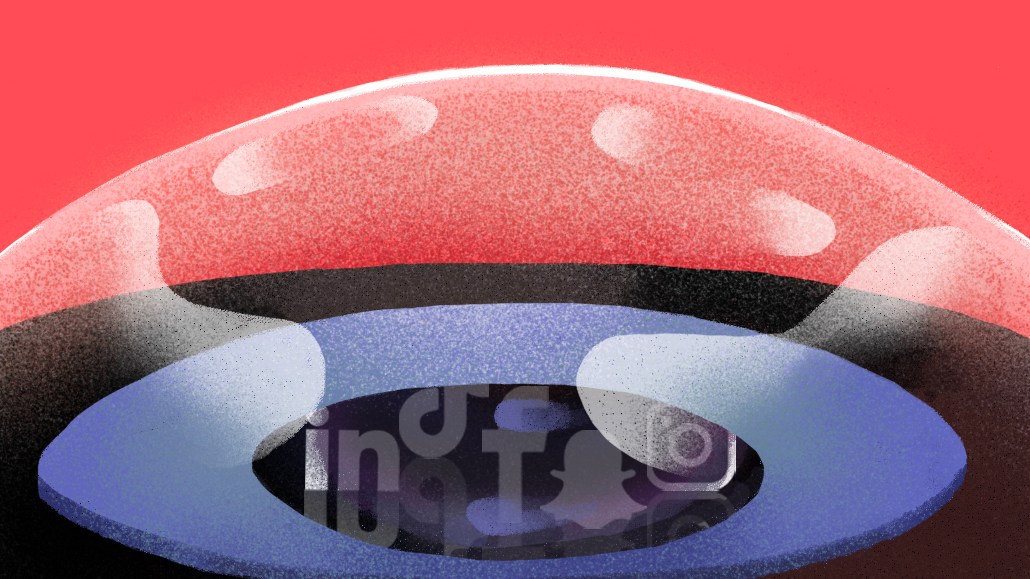Secure your place at the Digiday Media Buying Summit in Nashville, March 2-4
Digiday+ Research: Facebook, Instagram, YouTube valued by brands and agencies, but ad spend lags — especially on TikTok

This research is based on unique data collected from our proprietary audience of publisher, agency, brand and tech insiders. It’s available to Digiday+ members. More from the series →
Brands and agencies alike see the importance of social media when it comes to marketing success.
But, similar to how Digiday+ Research found that brands and agencies don’t see eye-to-eye on how much marketing spend should go toward Google, a survey of 90 brand and agency professionals in the third quarter revealed significant discrepancies between how brands and agencies allocate their marketing budgets on social media.
Digiday’s survey found that brands and agencies are in almost perfect alignment when it comes to how confident they are that social media platforms drive marketing success. Both groups said they are most confident in Facebook, with just over half of brand and agency pros saying they are confident or very confident the platform drives marketing success. Instagram and YouTube followed closely behind, with slightly more than 40% of brand and agency respondents saying they’re confident each platform drives marketing success. TikTok brought up the rear, with around a quarter of brand and agency pros saying they’re confident in the platform.
When looking at how brands and agencies allocate marketing budgets on each social platform, however, the groups’ marketing spends look very different.
When it comes to brands, Digiday’s survey found there are large discrepancies between brand pros’ confidence in the marketing success of each social media platform and the share of their marketing budgets that they allocate to each platform. For instance, while 52% of brand respondents said they are confident that Facebook drives marketing success, a mere 28% said they spend a large portion of their marketing budgets on the platform.
This pattern was repeated for each of the social media platforms Digiday asked about: 42% of brand pros said they’re confident that Instagram drives marketing success, but only 21% said they spend a large portion of their marketing budget on the platform. Forty-one percent said they’re confident in YouTube, but only 11% said they spend a large portion there. TikTok followed fairly far behind the others: Only 28% of brand respondents said they’re confident the platform drives success, and 7% said they dedicate a large share of their budget to TikTok.
For agencies, on the other hand, Digiday’s survey found that confidence and marketing spend are much more aligned for this group. When it comes to Facebook, 51% of agency respondents said they are confident the platform drives marketing success for their clients, and 43% back that confidence up with marketing spend by allocating a large portion of their clients budgets to Facebook. Instagram similarly followed Facebook, with 42% of agency pros saying they’re confident in Instagram and 36% saying a large portion of their clients’ marketing budgets are spent there.
The remaining social platforms were a bit further behind than their Meta-owned counterparts, however: 41% of respondents said they’re confident in YouTube, compared with 22% who said the platform gets a large share of their clients’ marketing budgets.
And TikTok lagged with 23% of agency pros saying they’re confident the platform drives marketing success and only 6% saying their clients spend a large portion of their marketing budgets on TikTok.
More in Marketing

Future of Marketing Briefing: AI’s branding problem is why marketers keep it off the label
The reputational downside is clearer than the branding upside, which makes discretion the safer strategy.

While holdcos build ‘death stars of content,’ indie creative agencies take alternative routes
Indie agencies and the holding company sector were once bound together. The Super Bowl and WPP’s latest remodeling plans show they’re heading in different directions.

How Boll & Branch leverages AI for operational and creative tasks
Boll & Branch first and foremost uses AI to manage workflows across teams.





